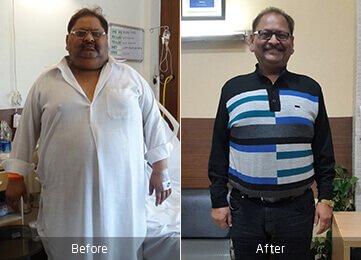Obesity is nowadays a major health hazard with worldwide rates having tripled since 1975. In 2016, more than 1.9 billion adults aged 18 years and older were overweight. Of these, over 650 million adults were obese and had obesity related problems. In India, the number of obese people has doubled in the last 10 years, according to the National Family Health Survey.
With research, we have realized that obesity is difficult to treat and it might require long term changes in lifestyle, as well as diet. Several researchers have highlighted that obesity accounts for 80-85 per cent of the risk of developing type-2 Diabetes. The survey highlights that urban population is more prone to obesity, as compared to their rural counterparts.
Obesity tends to run in families, suggesting there might be a genetic contribution. However, family members also tend to share the same diet and lifestyle habits. Environment also plays a role in obesity. Environmental factors include, what and how often a person eats, a person's level of activity and behavioral factors.
Obesity is on the rise among children, which is having disastrous results in the younger population thus affecting the newborns of these adults. In 2016, an estimated 41 million children, under the age of 5 years, were overweight or obese.
Obesity causes?
The basic cause of obesity and overweight is an energy imbalance between calories consumed and calories spent. In recent trends, there has been:
• Excessive intake of energy-dense foods that are high in fat.
• Decrease in physical activity due to the sedentary nature of many forms of work, changing modes of transportation, and increasing urbanization.
What are common health consequences of overweight and obesity?
• Cardiovascular diseases (mainly heart disease and stroke), which were the leading cause of death in 2012;
• Diabetes;
• Musculoskeletal problems (especially degenerative disease of the joints);
• Some of the cancers.
Childhood obesity is associated with a higher chance of obesity, premature death and disability in adulthood.
Low-calorie, low-fat diets, along with exercise - usually are recommended to treat obesity. "Crash" diets and appetite suppressants generally are appropriate only under very specific conditions and under strict supervision.
| Normal | 18 - 22.4 |
| Over-weight | 22.5 - 27.4 |
| Obese | 27.5 - 37.4 |
| Morbidly Obese | > 37.5 |

After gastric bypass procedure, most of the patients are expected to lose about 60-80% of their excess body weight. This weight loss occurs within 9-12 months post-surgery, although some weight regain is normal after 2-5 years in some of the patients.
Apart from weight loss, bariatric surgery is found to have beneficial effects on a large number of associated medical problems such as type II Diabetes, high blood pressure, acid reflux, Obstructive sleep apnea, polycystic ovarian disease, joint pains, stress incontinence. There are improvements in psychosocial and depressive disorders following bariatric surgery. Best of the bariatric surgical centers like Cleveland clinic, have time and again shown about 80% of remission from diabetes after bariatric surgery.
Patients are able to perform their routine activities and duties easily and happily as there is considerable mood elevation. Daily activities like getting in and out of a car, walking in the garden, shopping for clothes which they were not able to do previously can be done with much ease after bariatric surgery.






Severe obesity affects almost every organ of our body and there are several problems due to this which have been mentioned below. Weight loss achieved with gastric bypass surgery is sustained and can be maintained for several years following surgery. Most of the obesity related problems are resolved or improved following weight loss surgery. Those people who have lost weight by dieting alone might not experience improvement in these problems because weight loss from diet does not often last long.